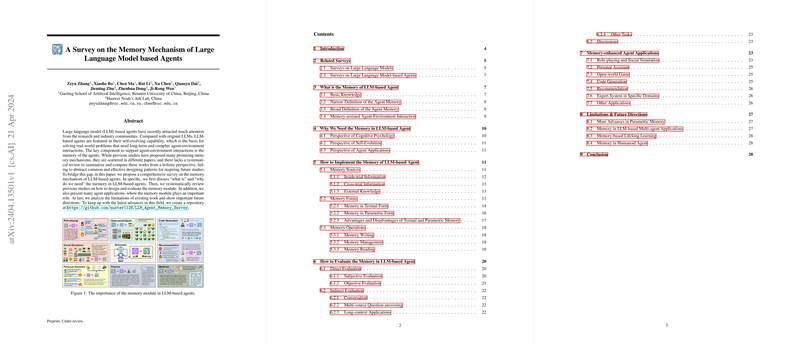Overview of Memory Mechanisms in LLM-based Agents
Introduction to Memory in Agents
LLMs have been integrated into a variety of agent-based applications, enhancing the agents' capability to interact, learn, and evolve within their environments. A critical component that differentiates these sophisticated agents from their earlier counterparts is their memory module. The memory empowers agents to recall past interactions, utilize learned experiences, incorporate external knowledge, and consequently, make informed decisions in real-time scenarios.
Memory in agents spans storing interaction history within a session (trial), recalling information from past sessions (cross-trial), and tapping into external databases or using APIs to access contemporary data. These memory sources are utilized in various operational forms, chiefly as textual and parametric memories. Textual memories are directly interpretable and involve sequences or structures of text, while parametric memories integrate information into the model's parameters, offering a more compact and efficient storage method but at the cost of direct interpretability.
The operationalization of memory involves three phases: writing, managing, and reading. These correspond to storing new information, processing and organizing this stored data, and retrieving appropriate memories to inform current interactions, respectively.
Theoretical and Practical Implications of Agent Memory
Theoretically, agent memory aligns with principles from cognitive psychology, suggesting that replicating human-like memory processes in agents could facilitate more natural and effective interactions. Practically, memory supports self-evolution by enabling learning from past mistakes, optimizing exploratory actions, and abstracting knowledge to generalize across different environments.
Agent memory finds applications in multifarious domains such as personal assistants, role-playing, social simulations, and more. These applications benefit distinctly from memory; for instance, personalized interactions in assistant applications rely on recalling user preferences and past interactions, while role-playing might utilize memory to maintain character consistency and backstory.
Challenges and Future Directions
Despite the advances, the implementation and management of memory in LLM-based agents confront several challenges:
- Scalability: Managing an ever-growing memory, particularly in long-lived agents or complex environments, can be problematic.
- Efficiency: Textual memory, while interpretable, may not scale efficiently, making parametric memory forms a potentially more viable option in resource-constrained scenarios.
- Complexity in Management: Ensuring that the memory contains relevant, non-redundant, and up-to-date information requires sophisticated management strategies.
Future research directions may involve developing more advanced parametric memory solutions that balance efficiency with interpretability, exploring multi-agent memory systems where agents share and synchronize memories to enhance collective decision-making, and enhancing the robustness of memory mechanisms to manage the complexity and dynamics of real-world environments effectively.
Conclusion
Memory in LLM-based agents represents a dynamic and crucial area of research that underpins the effectiveness of agent applications in diverse real-world scenarios. Advancements in this area hold the promise of creating more autonomous, intelligent, and versatile agent systems, driving the next generation of artificial intelligence applications.
